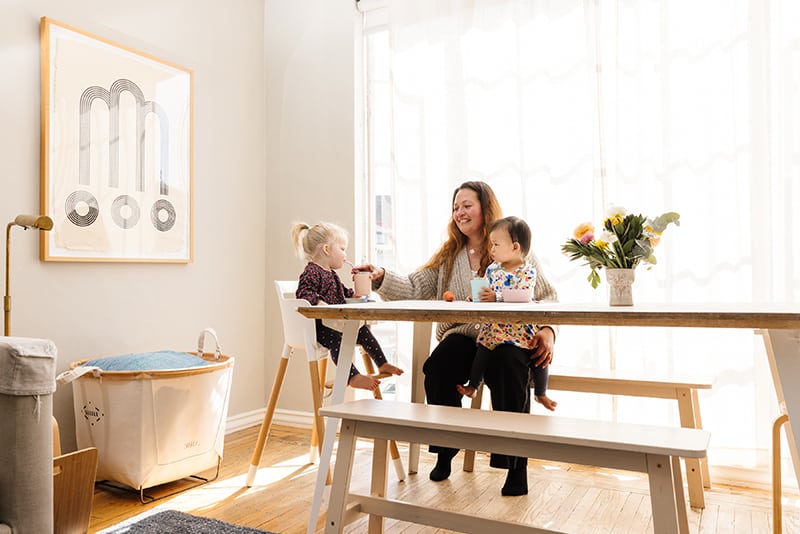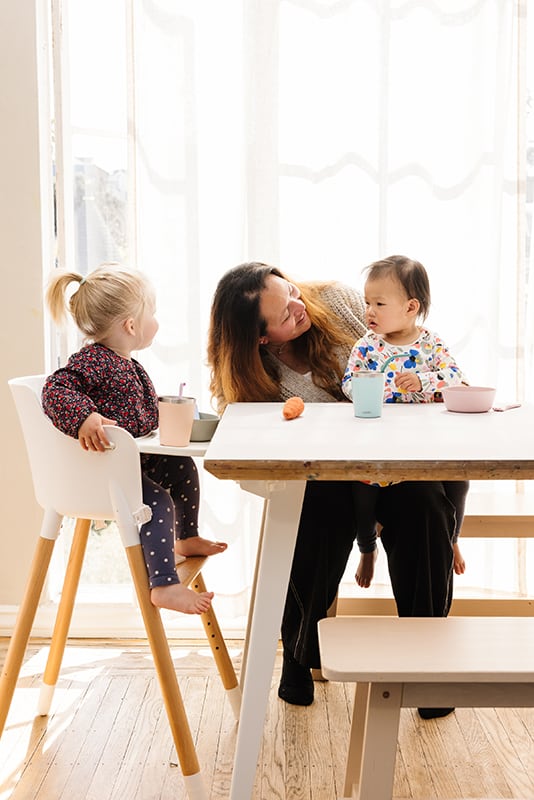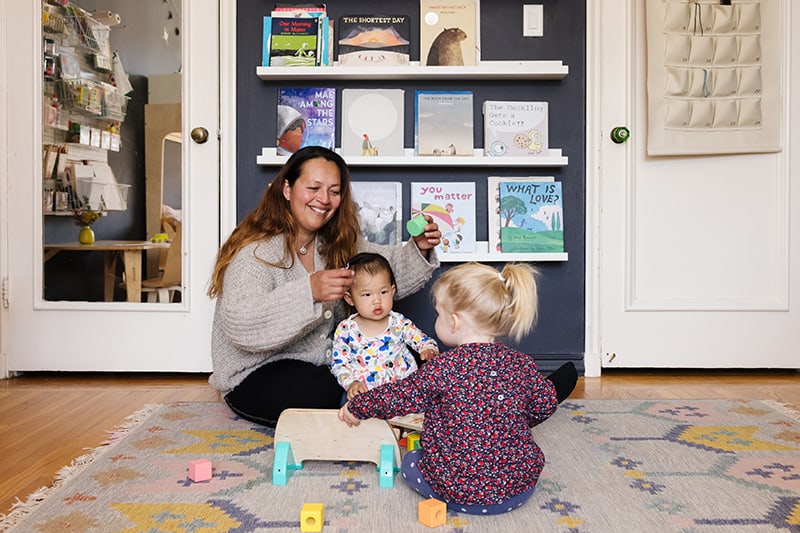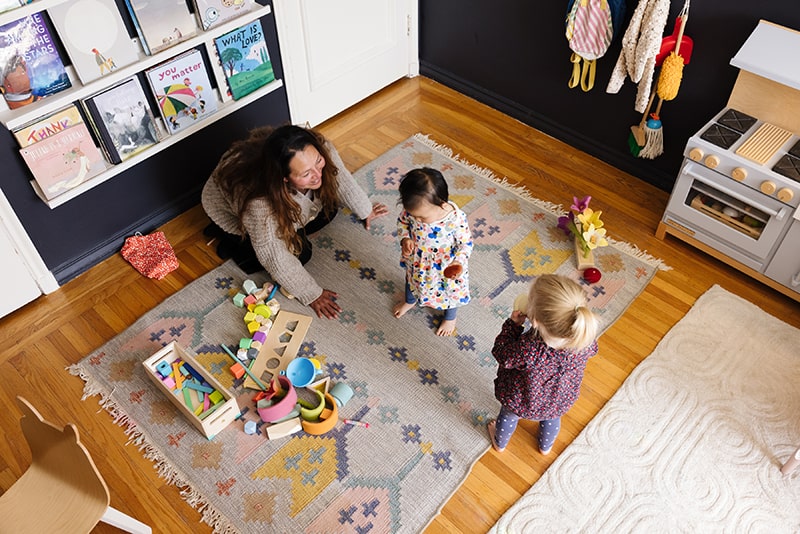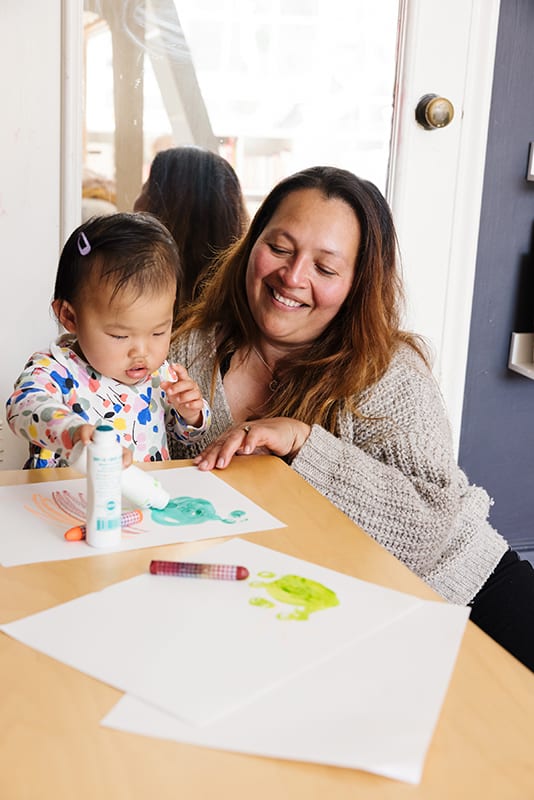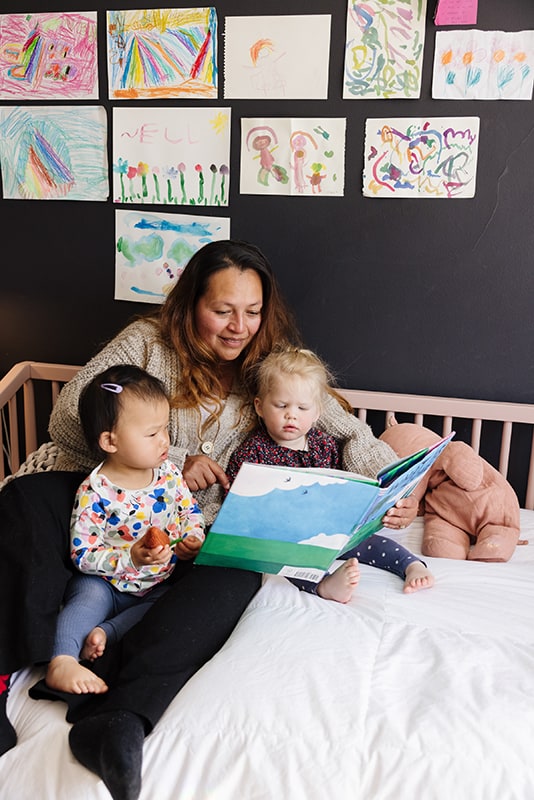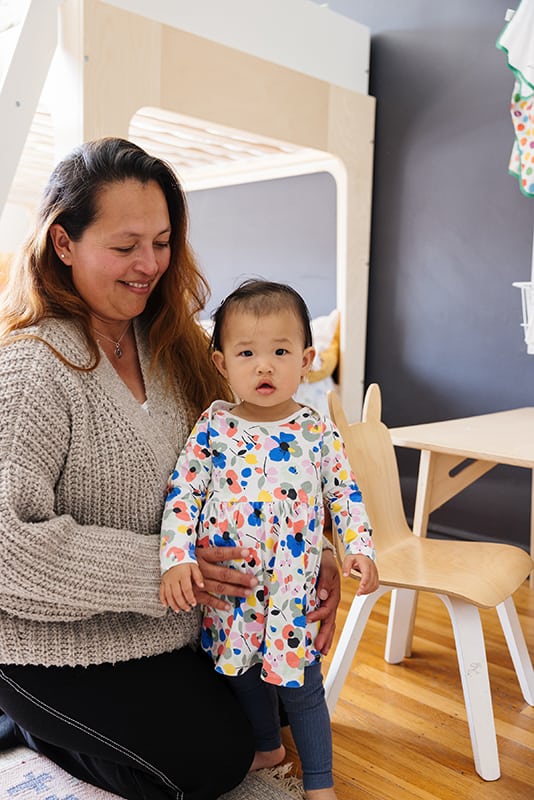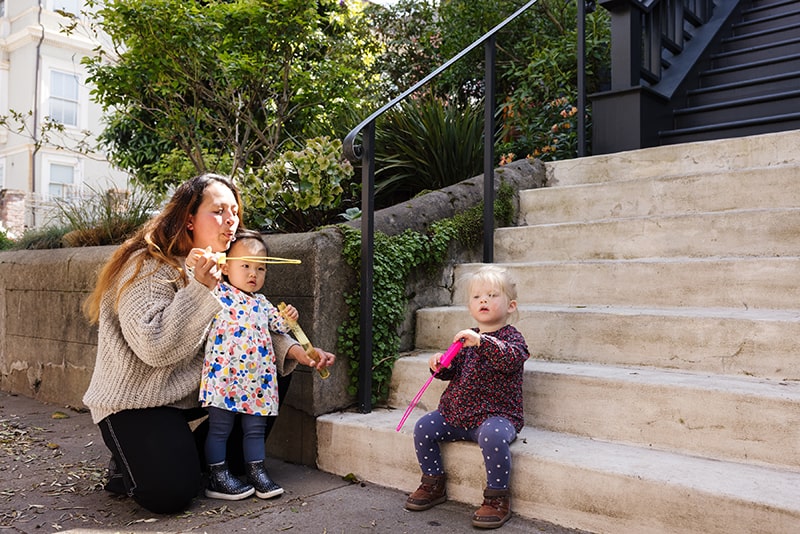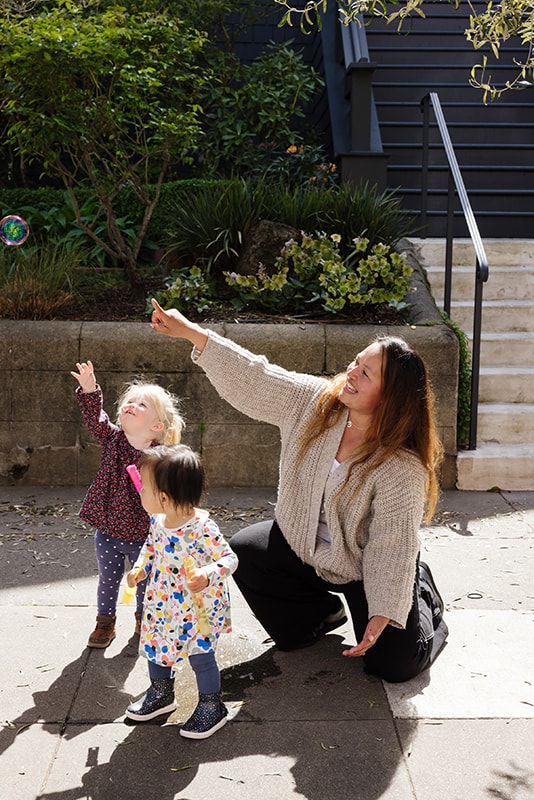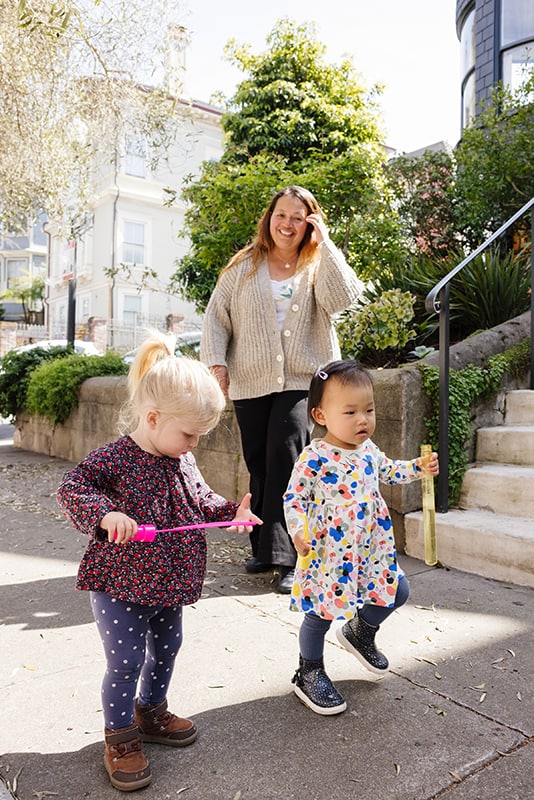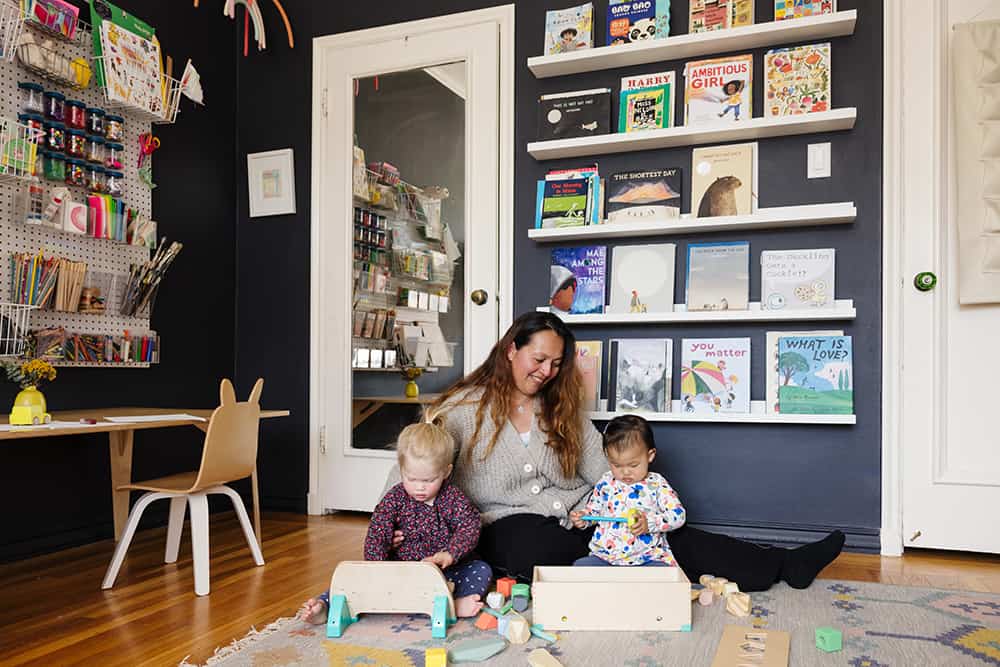
How To Make A Nanny Share Work
Written by Katie Hintz-Zambrano
Photography by Photographed by Kara Brodgesell
While the benefits of a “nanny share” are obvious—it’s a budget-friendly childcare solution with a built-in playmate!—the challenges to setting up and maintaining a successful share care can be numerous. That is, if you don’t plan ahead and anticipate the twists and turns that are sure to come up. To help guide you through a sometimes hairy process, we’ve pulled together a number of tried-and-true tips from parents who’ve successfully navigated nanny share setups, below.
Bonus: We’re letting you know how Vivvi’s unique nanny share services can make the process even simpler! The modern, dad-founded childcare brand is all about taking the headache out of finding—and retaining—an incredible caregiver. With a wide roster of fully vetted, in-home caregivers (a.k.a. “educators”) who are dedicated to early childhood development, Vivvi can easily match you and your partner family with a loving and reliable provider in a snap.
Read more about Vivvi as you flip through our must-read tips on nailing your nanny share experience.
This article is brought to you by Mother + Vivvi.
-
First things first, you need to find a nanny share family. In most situations, it’s best to have your partner family confirmed before you begin to search for a nanny.
Don't know anyone nearby in your kiddo's age range? Try putting feelers out in your friend group and/or neighborhood email group or messageboard if you're a part of one.
If you see a parent with a child of a similar age in your neighborhood (without a nanny) don't be afraid to strike up a conversation with them—maybe they're a potential match!
While you're at it, think about what's most important to you in your share care family. For example: having children of similar ages, geographic proximity, or whether you or the other family want to host.
-
Vivvi's in-home childcare services, available in cities across the U.S., can be split with another family for a more affordable option.
The company currently accepts a maximum of 2 children per 1 childcare provider in a nanny share setting. Children from 0 to 12-years-old are accepted.
Vivvi suggests finding your partner family first, but you can attend an information session about the company's nanny share options and unique learning approach while you are still searching!
-
One of the biggest questions for your share care family will be matching with someone who works with your own schedule and needs. (Including your kid's nap schedule).
Are you looking for full-time care during the week? Help with pick-ups and drop-offs, or evening care?
Vivvi currently offers full-day and half-day care, flexible hours, and anywhere from 20+ to 40+ hours a week—working with the nanny share families' needs to provide an optimal experience for all.
-
The beauty of a share care is that you can greatly reduce the amount you would normally spend per hour in solo care—plus, your kiddo gets a playmate!
Think about how much you can afford to spend on childcare and if it matches up with nanny share rates in your area.
When using Vivvi's nanny share option, hourly fees for in-home childcare are scaled to the hours of care you need and the experience level of your educator.
Beyond the cost of care, make sure you figure in any additional expenditures, including paid vacation, sick leave, and holiday gifts for your nanny.
Plus, the cost of securing a double-stroller and other shared use items.
-
Be sure to discuss by what method each family will be paying the childcare provider and when.
Also, how will you handle vacation, sick leave, over-time or bonus pay to your caregiver, as well as handle days when one child is sick or out of town?
When booking Vivvi, these common conundrums are already answered up front. Plus: from recruiting your in-home educator, to training, payroll, background and vaccine checks, insurance, and benefits, Vivvi can handle it all!
Or, if you prefer to take care of the details, Vivvi offers a caregiver placement-only option as well.
-
Will one family play host week in and week out? Or will you split hosting duties 50/50?
If you're hosting in two separate locations, try to keep a consistent schedule of when each house is playing host—this is key for your nanny, the children, and both families.
Additionally, figure out where the shared stroller will be stored or if it—and other shared items—will be toggled between both homes or purchased for each home.
-
Evaluate the spaces your child will be spending time in, in depth, including if it's baby-proofed, hygiene expectations, where children will eat and sleep, if there are any pets, and if any parents or other adults will be working from home.
A big believer in the power of early education in kids 0-12, Vivvi matches families with an educator who will take care of not only the daily curriculum for your kiddos, but also setting up your home for optimal learning!
This helps ensure that no matter which household is hosting, there will be a consistent learning experience across the environments.
-
Align with your share care family—and later your nanny—on your shared values and goals for your childcare setup.
Some topics to discuss include: expectations around at-home education, time spent outdoors, visits to the park, playground, library, and museums, screen time rules, etc.
Are both families comfortable with your caregiver driving the children in a car, or taking public transit?
Will the children share a nap schedule?
Do you imagine your nanny preparing food for the children throughout the day, or will each family provide meals and snacks?
No questions should be off-limits when interviewing your share family or caregiver—it's a big commitment!
-
When it comes to ages 0 to 5, play-based education is where it's at!
Luckily, if you go with Vivvi, all of its at-home educators are centrally supported by the company's expert team, giving them access to the best resources and training for early childhood education, so that they can adapt to any in-home environment.
For preschoolers, the brand's team of teachers designs an ever-changing curriculum that aligns interests of 2- to 5-year-olds with age-appropriate development, using a child's natural sense of curiosity as a powerful catalyst for learning.
Teachers encourage children to dive deeper into interests that they care about—key to being a lifelong learner!
Vivvi puts kids' observations into action through the curriculum webs that teachers build monthly based on children’s questions. With a share care set-up, it would be this individualized attention x 2!
-
Vivvi believes in enriching care from day 1 of a child's life. In addition to feedings and diaper changes, the Vivvi infant program is individualized to support each baby’s developmental milestones and daily routines up to 12 months old.
Once babies evolve to the toddler stage (12-24 months), it's all about helping them acquire knowledge through active exploration. Vivvi teachers facilitate this growth by introducing structure as well as encouraging independent curiosity throughout the day.
No matter the age of the child, some of the key topics explored at Vivvi include: Social & Emotional Learning, Self-Care, Literacy, Expressive Language, Receptive Language, Mathematical Learning, Scientific Inquiry, and Fine & Gross Motor Skills.
-
Just as you'll be interviewing your share care family to make sure you are in alignment, you will be interviewing your potential caregiver in depth, too.
In addition to finding out more about their childcare and education philosophy, be sure to discuss their previous experience, salary requirements, training (in CPR, First Aid, etc.), language preferences, vaccination status, and expectations and preferences around vacation and sick leave.
When using Vivvi , they'll do the heavy lifting for you—including taking care of the interview process! The brand also requires its educators be up-to-date on vaccinations, and take weekly COVID tests and daily temperature checks. All Vivvi teachers are also CPR and First Aid certified.
-
Having open lines of communication is especially important in a nanny share scenario.
You should strive to have a transparent relationship with your nanny and your share care family from the very beginning.
Discuss how long you intend to be in the nanny share, when you anticipate you might want to start your child in Pre-K or Kinder, and include giving X-month's notice as part of your contract.
Before hot-button topics come up, try to have the hard questions in the interview process. Including...
What is your discipline style?
How do you like to communicate?
How do you like to handle disputes?
How would you like to cover additional costs?
How should we deal with a child getting sick?
Or the caregiver getting sick?
What about vacation coverage?
How will we handle a repeated issue?
Share this story

